927892-学术英语-presentation-topic 4 彭芃
- 格式:pptx
- 大小:106.90 KB
- 文档页数:6
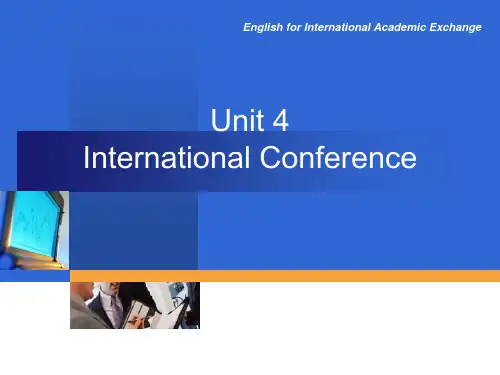
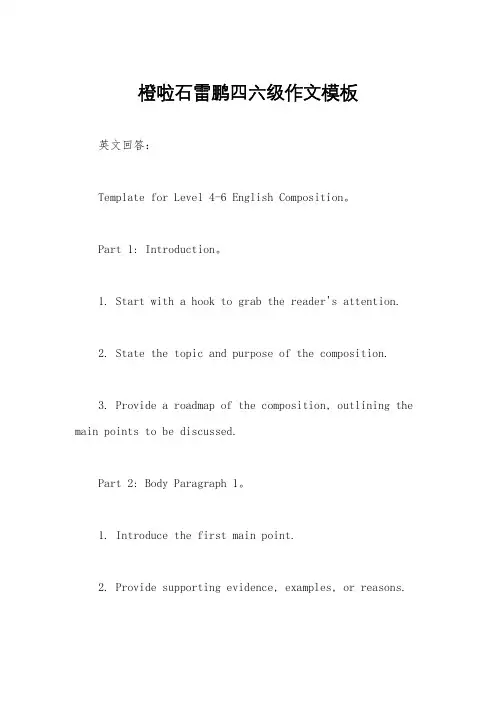
橙啦石雷鹏四六级作文模板英文回答:Template for Level 4-6 English Composition。
Part 1: Introduction。
1. Start with a hook to grab the reader's attention.2. State the topic and purpose of the composition.3. Provide a roadmap of the composition, outlining the main points to be discussed.Part 2: Body Paragraph 1。
1. Introduce the first main point.2. Provide supporting evidence, examples, or reasons.3. Use transition words to connect ideas.4. Summarize the main point at the end of the paragraph. Part 3: Body Paragraph 2。
1. Introduce the second main point.2. Provide supporting evidence, examples, or reasons.3. Use transition words to connect ideas.4. Summarize the main point at the end of the paragraph. Part 4: Body Paragraph 3 (optional)。
1. Introduce the third main point (if necessary).2. Provide supporting evidence, examples, or reasons.3. Use transition words to connect ideas.4. Summarize the main point at the end of the paragraph.Part 5: Conclusion。
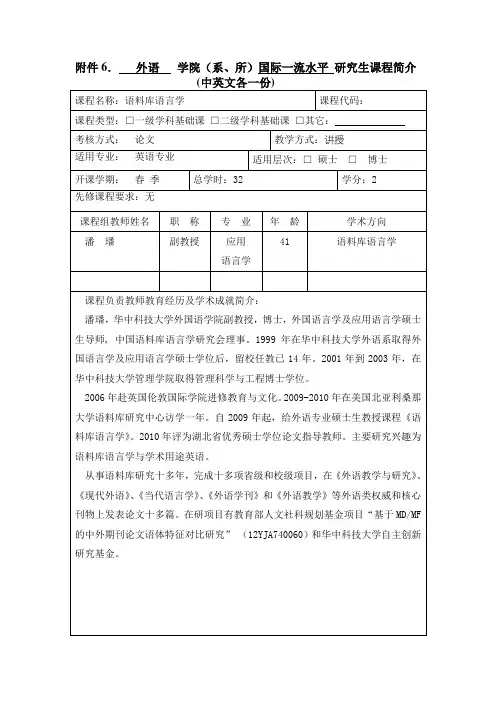
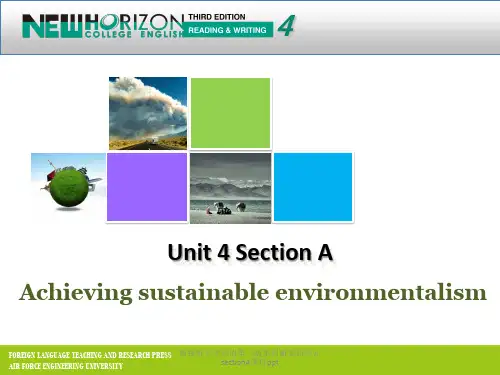
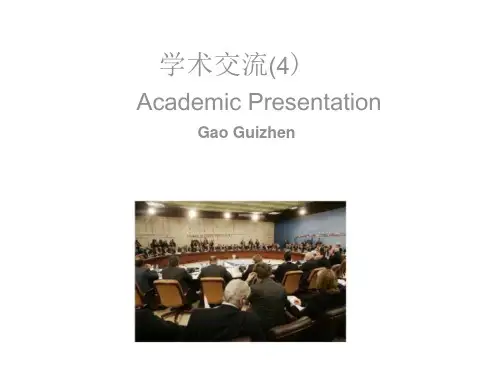
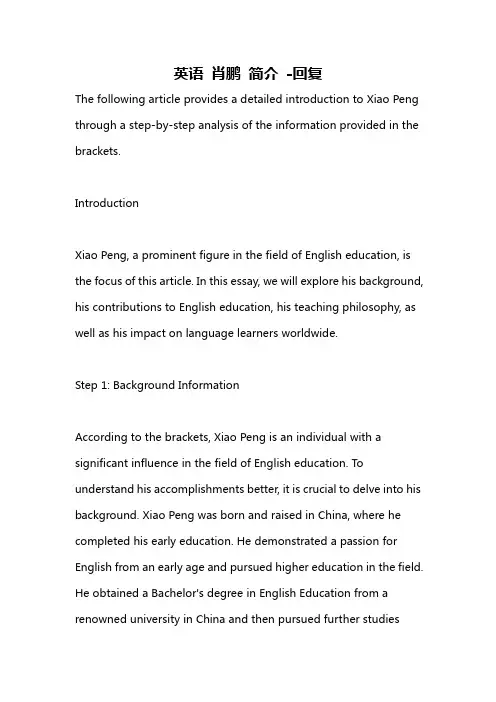
英语肖鹏简介-回复The following article provides a detailed introduction to Xiao Peng through a step-by-step analysis of the information provided in the brackets.IntroductionXiao Peng, a prominent figure in the field of English education, is the focus of this article. In this essay, we will explore his background, his contributions to English education, his teaching philosophy, as well as his impact on language learners worldwide.Step 1: Background InformationAccording to the brackets, Xiao Peng is an individual with a significant influence in the field of English education. To understand his accomplishments better, it is crucial to delve into his background. Xiao Peng was born and raised in China, where he completed his early education. He demonstrated a passion for English from an early age and pursued higher education in the field. He obtained a Bachelor's degree in English Education from a renowned university in China and then pursued further studiesabroad in an English-speaking country.Step 2: Contributions to English EducationXiao Peng's contributions to English education have been substantial. After completing his studies abroad, he returned to China and devoted himself to improving English language teaching in the country. He has published numerous research papers and articles on effective teaching methodologies, language acquisition, and language assessment. His work has been widely recognized and has played a significant role in shaping the English education landscape in China.Furthermore, Xiao Peng has been actively involved in curriculum development. He has contributed to the design and implementation of innovative English language courses that focus on communicative competence and cultural understanding. These courses have been adopted by various educational institutions and have had a positive influence on learners' language proficiency and intercultural communication skills.Step 3: Teaching PhilosophyXiao Peng's teaching philosophy is centered aroundstudent-centered learning and communicative language teaching. He firmly believes that students should be active participants in the learning process, rather than passive recipients of information. According to him, effective teaching requires creating an environment that stimulates students' curiosity, encourages critical thinking, and fosters a desire for lifelong learning.Xiao Peng also emphasizes the importance of authentic communication in language learning. He encourages learners to engage in meaningful interactions, both inside and outside the classroom. He believes that immersing oneself in anEnglish-speaking environment, be it through conversations with native speakers or through extensive reading and listening activities, is crucial for attaining native-like proficiency.Step 4: Impact on Language Learners WorldwideXiao Peng's influence extends beyond the borders of China. His research findings and innovative teaching approaches have been adopted by educators around the world. English language learnersfrom different countries have benefited from his insights and strategies, leading to improved language skills and cultural awareness.Moreover, Xiao Peng has actively engaged in international conferences and workshops, where he presents his research and shares his teaching experiences. These platforms have allowed him to interact with educators from diverse backgrounds, contributing to the global exchange of ideas in English education.ConclusionIn conclusion, Xiao Peng is a highly regarded figure in English education, with significant contributions to the field. Through his research, curriculum development, teaching philosophy, and international engagement, he has made a lasting impact on language learners worldwide. His dedication and expertise have helped shape the way English is taught and learned, inspiring educators and learners alike.。
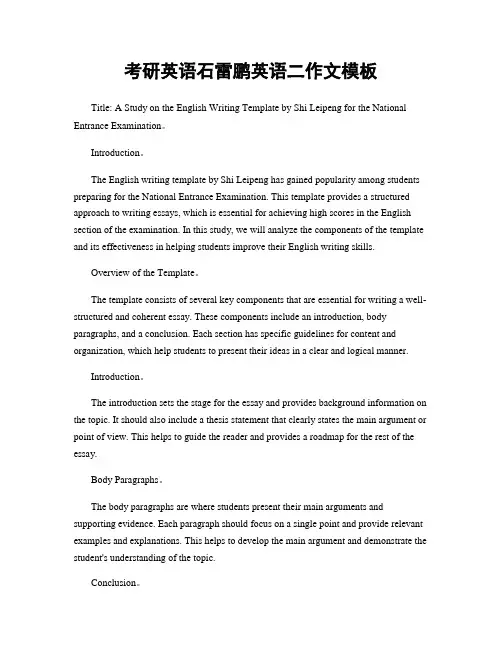
考研英语石雷鹏英语二作文模板Title: A Study on the English Writing Template by Shi Leipeng for the National Entrance Examination。
Introduction。
The English writing template by Shi Leipeng has gained popularity among students preparing for the National Entrance Examination. This template provides a structured approach to writing essays, which is essential for achieving high scores in the English section of the examination. In this study, we will analyze the components of the template and its effectiveness in helping students improve their English writing skills.Overview of the Template。
The template consists of several key components that are essential for writing a well-structured and coherent essay. These components include an introduction, body paragraphs, and a conclusion. Each section has specific guidelines for content and organization, which help students to present their ideas in a clear and logical manner.Introduction。
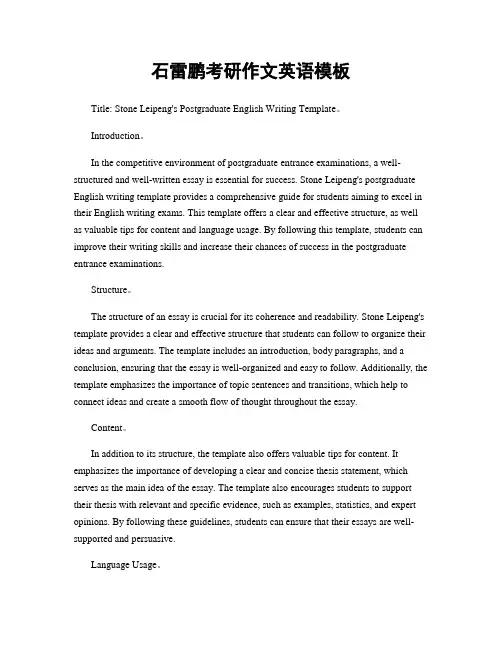
石雷鹏考研作文英语模板Title: Stone Leipeng's Postgraduate English Writing Template。
Introduction。
In the competitive environment of postgraduate entrance examinations, a well-structured and well-written essay is essential for success. Stone Leipeng's postgraduate English writing template provides a comprehensive guide for students aiming to excel in their English writing exams. This template offers a clear and effective structure, as well as valuable tips for content and language usage. By following this template, students can improve their writing skills and increase their chances of success in the postgraduate entrance examinations.Structure。
The structure of an essay is crucial for its coherence and readability. Stone Leipeng's template provides a clear and effective structure that students can follow to organize their ideas and arguments. The template includes an introduction, body paragraphs, and a conclusion, ensuring that the essay is well-organized and easy to follow. Additionally, the template emphasizes the importance of topic sentences and transitions, which help to connect ideas and create a smooth flow of thought throughout the essay.Content。
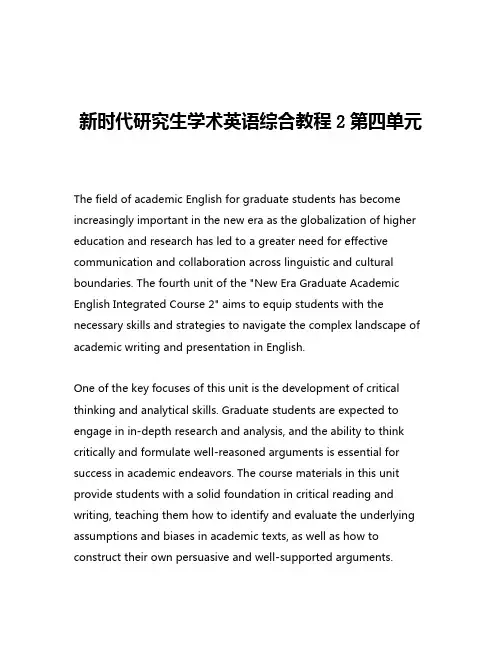
新时代研究生学术英语综合教程2第四单元The field of academic English for graduate students has become increasingly important in the new era as the globalization of higher education and research has led to a greater need for effective communication and collaboration across linguistic and cultural boundaries. The fourth unit of the "New Era Graduate Academic English Integrated Course 2" aims to equip students with the necessary skills and strategies to navigate the complex landscape of academic writing and presentation in English.One of the key focuses of this unit is the development of critical thinking and analytical skills. Graduate students are expected to engage in in-depth research and analysis, and the ability to think critically and formulate well-reasoned arguments is essential for success in academic endeavors. The course materials in this unit provide students with a solid foundation in critical reading and writing, teaching them how to identify and evaluate the underlying assumptions and biases in academic texts, as well as how to construct their own persuasive and well-supported arguments.Another important aspect of this unit is the emphasis on academic writing conventions and styles. Graduate-level writing in the English language requires a high level of proficiency in areas such as grammar, syntax, and vocabulary, as well as a strong understanding of the specific rhetorical structures and formatting requirements of academic genres such as research papers, literature reviews, and dissertations. The course materials in this unit cover a range of writing strategies and techniques, including effective organization, coherence, and cohesion, as well as the appropriate use of citations and references.In addition to written communication, this unit also addresses the skills required for effective oral presentations in academic settings. Graduate students are often called upon to present their research findings and ideas to their peers and faculty members, and the ability to deliver clear, concise, and engaging presentations is crucial for success in these situations. The course materials in this unit provide students with guidance on topics such as presentation structure, visual aids, and delivery techniques, as well as strategies for handling questions and engaging with the audience.One of the unique features of this unit is its focus on the cultural and linguistic diversity of the graduate student population. Many graduate programs, particularly in the sciences and engineering fields, attract students from a wide range of cultural and linguisticbackgrounds, and navigating the academic landscape in a non-native language can present significant challenges. The course materials in this unit address these challenges by providing students with insights into the cultural norms and expectations of the English-speaking academic community, as well as strategies for overcoming language barriers and effectively communicating their ideas to an international audience.Throughout the unit, students are encouraged to engage in hands-on, collaborative learning activities that allow them to apply the concepts and strategies they have learned to real-world academic scenarios. This includes peer review exercises, group discussions, and simulated presentation scenarios, all of which are designed to help students develop the practical skills and confidence they need to succeed in their academic pursuits.Overall, the fourth unit of the "New Era Graduate Academic English Integrated Course 2" represents a comprehensive and multifaceted approach to preparing graduate students for the challenges and demands of academic communication in English. By fostering critical thinking, analytical skills, and proficiency in written and oral communication, this unit equips students with the tools they need to thrive in the increasingly globalized and competitive world of graduate-level research and scholarship.。


石雷鹏考研英语二大作文的深度解读与高分攻略As the importance of the postgraduate entrance examination in China cannot be overstated, the English section, especially the second major composition, holds a pivotal position in the overall score. In this article, we will delve into the secrets of the Second Major Composition in the context of Shi Leipeng's teaching methodology, aiming to provide you with a comprehensive understanding and a strategy for achieving high scores.**The Structure of the Composition**The Second Major Composition in the postgraduate entrance examination is typically a narrative or argumentative essay. Regardless of the genre, a clear and logical structure is crucial. Shi Lepeng emphasizes the importance of a three-paragraph structure: introduction, body, and conclusion.**Introduction**The introduction should begin with a concise overview of the topic, followed by a clear statement of yourposition or argument. This paragraph should aim to engage the reader and set the tone for the essay.**Body**The body of the essay should consist of two or three paragraphs, depending on the length requirement. Each paragraph should focus on a specific aspect of your argument, supported by evidence and examples. Shi Lepeng advises students to use a variety of sentence structures and vocabulary to enhance the readability and impact of their writing.**Conclusion**The conclusion should sum up your main points and reinforce your argument. It should leave a lasting impression on the reader and leave no room for doubt about your position.**The Secrets of High Scores**According to Shi Lepeng, there are several key factors that contribute to achieving high scores in the Second Major Composition:1. **Understanding the Prompt**: It is essential to carefully read and fully understand the prompt. This will help you identify the key points and arguments that need to be addressed in your essay.2. **Planning Your Essay**: Before starting to write, it is crucial to plan your essay. This includes deciding on the structure, main points, and examples you will use to support your argument.3. **Using a Variety of Sentence Structures and Vocabulary**: Varying your sentence structures and using a rich vocabulary will help make your writing more engaging and impressive.4.**Practicing Regularly**: Like any other skill, writing requires regular practice. By practicing writing essays on different topics, you will become more familiar with the structure and requirements of the Second Major Composition.5. **Feedback and Revision**: After writing your essay, it is important to seek feedback from teachers or peers. This will help you identify areas where you can improve and refine your writing.In conclusion, achieving high scores in the Second Major Composition of the postgraduate entrance examination requires a clear understanding of the structure and requirements of the essay, as well as regular practice andfeedback. By following Shi Lepeng's teaching methodologyand applying the secrets of high scores discussed in this article, you can confidently approach this challenging task and emerge victorious.**中文解读与高分策略**在中国,考研的重要性不言而喻,而英语科目,尤其是大作文部分,在整体分数中占据重要地位。
雷石鹏英语二作文模板Introduction。
In today's world, learning English has become increasingly important. English is not only the most widely spoken language in the world, but it is also the language of business, science, and technology. Therefore, it is essential for students to have a strong command of the English language. In this essay, we will explore the importance of learning English and provide a template for writing a well-structured English essay.Body。
Paragraph 1: Importance of Learning English。
English is the global language of communication. It is spoken by over 1.5 billion people around the world and is the official language of 53 countries. In addition, English is the language of international business, diplomacy, and tourism. Therefore, learning English opens up a world of opportunities for students, allowing them to communicate with people from different cultures and backgrounds.Paragraph 2: Academic and Career Opportunities。
北京师范大学外国语言学及应用语言学彭宣维功能语言学考博真题-参考书-分数线一、专业的设置北京师范大学外国语言文学学院每年招收博士生14人,下设英语语言文学、俄语语言文学、日语语言文学、外国语言学及应用语言学,共4个专业。
外国语言学及应用语言学专业下设4个方向,分别是程晓堂、罗少茜的应用语言学;彭宣维的功能语言学;苗兴伟、于晖的语篇语言学;武尊民的语言测试与评价。
二、考试的科目功能语言学的考试科目为:①1113二外(日语)或1114二外(法语)②2018普通语言学③3088功能语言学与语言认知理论三、导师介绍彭宣维,男,四川通江人,北京师范大学外国语言文学教授,博士生导师。
研究方向:现在主义及其范式下的语言学理论与应用,包括现在主义哲学、语言过程与维度模式建构、语篇分析、隐喻、评价理论、评价文体学、评价语料库、双语辞书学、外语教学、现代语言科学视角下的《说文解字》研究等四、参考书目专业课信息应当包括一下几方面的内容:第一,关于参考书和资料的使用。
这一点考生可以咨询往届的博士学长,也可以和育明考博联系。
参考书是理论知识建立所需的载体,如何从参考书抓取核心书目,从核心书目中遴选出重点章节常考的考点,如何高效的研读参考书、建立参考书框架,如何灵活运用参考书中的知识内容来答题,是考生复习的第一阶段最需完成的任务。
另外,考博资料获取、复习经验可咨询叩叩:肆九叁叁,柒壹六,贰六,专业知识的来源也不能局限于对参考书的研读,整个的备考当中考生还需要阅读大量的paper,读哪一些、怎么去读、读完之后应该怎么做,这些也会直接影响到考生的分数。
第二,专题信息汇总整理。
每一位考生在复习专业课的最后阶段都应当进行专题总结,专题的来源一方面是度历年真题考点的针对性遴选,另一方面是导师研究课题。
最后一方面是专业前沿问题。
每一个专题都应当建立详尽的知识体系,做到专题知识点全覆盖。
第三,专业真题及解析。
专业课的试题都是论述题,答案的开放性比较强。
高教版PETS-2教材评估与分析
彭芳
【期刊名称】《科技信息》
【年(卷),期】2009(000)033
【摘要】教材评估对语言的教与学非常重要.本文基于McDonough和Shaw提出的内、外部评估细则,对高等教育出版社的公共英语等级考试的第二级教材(以下简称"高教版PETS-2")作了详细的评估与分析.分析结果证明教材基本符合内、外部评估细则.
【总页数】2页(P575-576)
【作者】彭芳
【作者单位】上海理工大学外语学院,中国,上海,200093
【正文语种】中文
【相关文献】
1.ESP教材评估对教师提高教学能力和自身专业素养的启示r——以导游英语教材评估为例 [J], 汪晖
2.几个国外英语教材评估体系的理论分析--兼谈对中国大学英语教材评估的启示[J], 赵勇;郑树棠
3.高教版《英语泛读教程》教材评估和教法探析 [J], 李建萍
4.高教版《英语泛读教程》教材评估和教法探析 [J], 李建萍
5.从坎宁斯沃思教材评估体系看《新视野大学英语》(第三版)的双文化图式构建[J], 王胜利
因版权原因,仅展示原文概要,查看原文内容请购买。
基于需求分析探索中药类研究生的专业英语教学曾祖平;常珊珊;彭冰;刘斌;雷海民;高增平【期刊名称】《医学教育管理》【年(卷),期】2017(000)0S1【摘要】目的探索中药类研究生专业英语课程的教学思路。
方法对在读硕士研究生进行关于专业英语教学的无记名问卷调查,统计学生对于专业英语课程的实际需求,针对统计结果设计专业英语课程的教学方法、教学内容以及考核方式。
结果92%的研究生认为需要开设专业英语课程,且66%的学生希望能重点提高SCI论文的写作能力,因此,中药类研究生的专业英语课程需要选择近期发表的SCI论文作为主要教学内容,采用情景模拟式和研讨式的教学方法,并且引入学生互评的手段让学生参与到考核环节。
结论中药类研究生专业英语课程的教学应从学生的实际需求出发,将教学重点放在提高学生SCI论文的阅读和写作能力方面。
【总页数】4页(P32-35)【作者】曾祖平;常珊珊;彭冰;刘斌;雷海民;高增平【作者单位】首都医科大学附属北京中医医院研究所;北京中医药大学中药学院;首都医科大学附属北京中医医院研究所;北京中医药大学中药学院;首都医科大学附属北京中医医院研究所;北京中医药大学中药学院;首都医科大学附属北京中医医院研究所;北京中医药大学中药学院;首都医科大学附属北京中医医院研究所;北京中医药大学中药学院;首都医科大学附属北京中医医院研究所;北京中医药大学中药学院【正文语种】中文【中图分类】G643【相关文献】1.基于创新能力培养改革经管类研究生专业英语教学 [J], 张珺2.电气类研究生专业英语教学模式的探讨 [J], 崔杨;初壮;李娟;孙亮3.基于需求分析探索中药类研究生的专业英语教学 [J], 曾祖平;常珊珊;彭冰;刘斌;雷海民;高增平;4.中药学研究生专业英语教学初探 [J], 程轩轩5.基于需求分析探索中药类研究生的专业英语教学 [J], 曾祖平;常珊珊;彭冰;刘斌;雷海民;高增平因版权原因,仅展示原文概要,查看原文内容请购买。